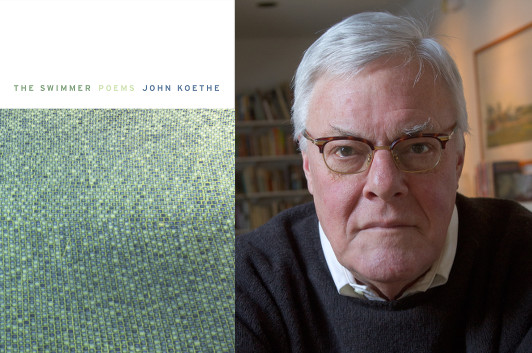John Koethe and the Poetic Sentence

photo: Tom Bamberger
The poems in John Koethe’s The Swimmer are like personal essays, a mixture of autobiographical anecdote and layered references to literature, art, science, and philosophy. And one of the first things you’ll notice about the cadence of those poems is its similarity to prose—but it’s not a “ordinary sentences peppered with random line breaks” kind of banal, descriptive poetry; these are complex, intricate sentences that, as Koethe explains in this essay, aim to mirror the processes of recollection and reflection that shape our memories, and the ways we come to see what we have experienced through what we have learned. There is no memory without interpretation, and as we re-interpret our pasts, we are also re-defining our present.
I started writing poetry in 1964 as a sophomore in college, after a course on modern literature in which I first read the poets of high modernism. I wasn’t sure exactly what they were doing, but I was bowled over by it and knew I wanted to try to do it too. Learning to write poetry is at first a process of imitation—especially back then, before the proliferation of programs in “creative writing” (how I hate that term!)—and while my first models were Eliot (whom I still revere) and Pound (whom I don’t care for anymore, apart from his Chinese (non)translations), that circle soon expanded to include Wordsworth and Keats, John Ashbery and James Schuyler, Wallace Stevens, Marianne Moore and Elizabeth Bishop, and later on Philip Larkin; as well as fiction writers like Proust, Fitzgerald, Thomas Pynchon and even Raymond Chandler.
What these writers have in common is that they’re all great writers of sentences, and sentences are at the heart of what I’m after in poetry, perhaps to a greater extent than they are for many other poets. What I try to do is capture the feeling and movements of thought, and not only are sentences the vehicles of thought, their clauses and connectives allow them to convey the rhythmic and emotional cadences that are an integral part of the experience of thought.
With any luck you eventually digest your early influences, for better or worse, and it’s been many years since I’ve been aware of a feeling of being guided in my writing by the work of other writers. Yet those first influences remain important to me as an ideal, or an idea, of how to think of poetry. I think of modernism as a continuation of, rather than a break with, romanticism, in that both are concerned to situate the inner self in relation to its objective social and physical setting in the world. In its high romantic incarnation, this concern takes the revelatory form of what Kant called the experience of the sublime; in its disillusioned modern incarnation it verges on the tragic.
At the heart of both versions of this vision is the fact of the individual subjective consciousness, something that’s at the same time the most singular and the most commonplace thing in the world, and which remains the source of all value, whether moral, intellectual or aesthetic. When I said a minute ago that my aim in poetry is to capture the feeling and movements of thought, it was because I think of that aim as being in the service of this essentially humanistic conception of poetry, which involves conveying a sense of what it’s like to be alive.
That’s why those early influences remain important to me as models, even if no longer stylistic ones. The ambition of many poets and the expectations of many readers seem to me to have diminished considerably in the decades since I started writing, to the extent that I seldom feel a sense of the revelatory or the tragic in the work of new poets I encounter. What there does seem to be in abundance are feelings of energetic engagement, psychological insight or solace, and while it would be churlish to complain about such genuinely satisfying qualities, they aren’t the ones that electrified me in 1964 and to which I still aspire.
Eliot and Harold Bloom have, in different ways, emphasized that poetry only fully exists in relation to its past, and that poets ought to be responsive not to their audiences but to their predecessors, which is what those original influences still represent to me. I know this can sound grandiose or empty, but properly understood it shouldn’t. To represent life in full and at the same time to situate it sub specie aetertnitatis to represent it in all of its particularity, and to situate it in the midst of the occasional and the mundane.
20 March 2016 | poets on poets |

 Our Endless and Proper Work is my new book with Belt Publishing about starting (and sticking to) a productive writing practice.
Our Endless and Proper Work is my new book with Belt Publishing about starting (and sticking to) a productive writing practice. 
